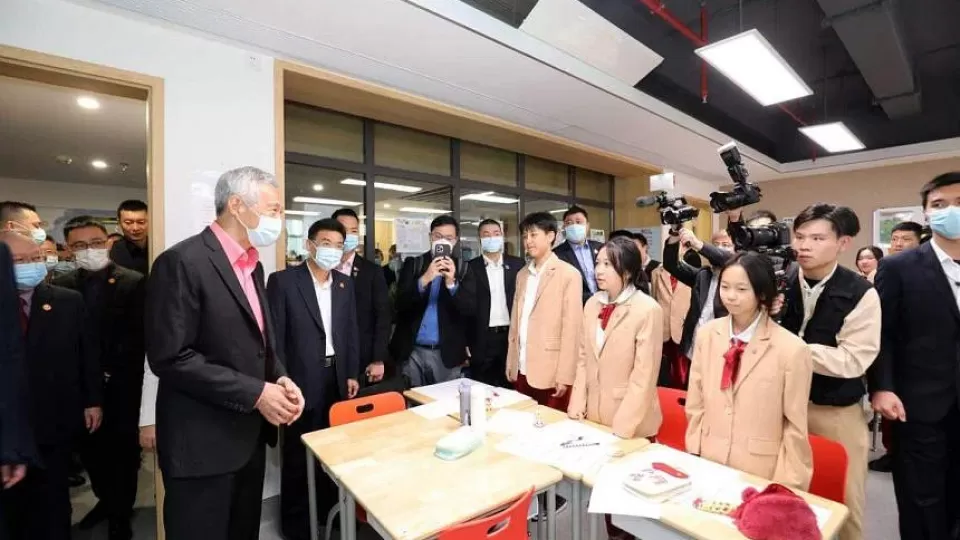March 29, 2023
GUANGZHOU – Singapore companies are raring to plunge back into the Chinese market following its post-Covid-19 reopening, prompting a joint Singapore-China development project in Guangzhou to speed up its expansion by four months.
The second phase of the China-Singapore Smart Park, which focuses on tech innovation and smart cities, will be completed in June ahead of its October timeline.
It is sited within the China-Singapore Guangzhou Knowledge City, where Singapore Prime Minister Lee Hsien Loong made his first stop on Tuesday, on the second day of his official visit to China.
The 232 sq km township, about an hour north of Guangzhou’s city centre, was started in 2010 as a private sector-led endeavour to grow high-tech industries integrated with residential, commercial and recreational developments.
There, PM Lee visited the China-Singapore International Joint Research Institute, which was jointly set up by Nanyang Technological University and South China University of Technology, and focuses on research areas such as artificial intelligence, new energy, green buildings and pollution control.
He also spoke to some companies at the International LaunchPad, a one-stop service platform within the smart park for companies wanting to enter the China market.
International LaunchPad helps companies unfamiliar with conditions in China to navigate the system, and plays the role of matchmaker by connecting them to government agencies and potential investors and partners, as well as provide working space.
Mr Kenneth Teo, deputy chief executive of Guangzhou Knowledge City, said the smart park has brought forward its timeline to complete Phase 2 – which comprises six buildings – because of pent-up demand due to Covid-19.
“The interest from companies is very strong. They have been ramping up the roll-out of the plans they had for the last three years,” he said.
The Chinese authorities have also been supportive in trying to get regulatory approvals quicker, he said.
Singrow, a Singapore agri-tech start-up that has found a way to grow strawberries in tropical conditions using proprietary genomics technology, set up shop in the business park in February and aims to open China’s first fully industrialised seedling production facility at Guangzhou Knowledge City by 2024. It would have entered the China market sooner if not for the pandemic.
“China is the world’s biggest strawberry market. And there is a 20 billion yuan (S$3.8 billion) market in the off-season, except there is no tech to grow them then,” said Dr Bao Shengjie, founder, CEO and chief scientist of the start-up.
“This is a huge market with no competitor,” he said of his technology, which has also been applied to other crops such as saffron, tomatoes, grapes and blueberries.
Singapore biotech start-up BioSyngen, which is developing cancer treatments in China, found Guangzhou Knowledge City to be a good base from which to launch its venture in China. A cluster of top hospitals within a small radius means it can conduct clinical trials more quickly, with access to more patients.

PM Lee viewing a presentation by Singapore biotech start-up BioSyngen during his visit to the China-Singapore Guangzhou Knowledge City. PHOTO: LIANHE ZAOBAO
Unlike Singrow, it faces many competitors in the cell therapy space in China. Data by the Food and Drug Administration in the United States shows that of the nearly 900 clinical trials that are going on worldwide, more than half are in China, said BioSyngen’s chief business officer Isaac Chow.
“So, we are also in the race to get it across the line,” he said.
On Tuesday, PM Lee also visited Guangzhou SingChin Academy at the park, the only school outside Singapore co-managed by Hwa Chong International School. He then had lunch with some Singapore corporate leaders based in Guangdong.
Later that evening, he toured Yongqingfang, a cultural conservation area of historical buildings. He was accompanied by Mrs Lee, along with Trade Minister Gan Kim Yong, Health Minister Ong Ye Kung, Foreign Minister Vivian Balakrishnan, Senior Minister of State for Foreign Affairs Sim Ann and Senior Parliamentary Secretary for Health Rahayu Mahzam.

PM Lee touring Yongqingfang, a cultural conservation area of historical buildings, in Guangzhou on Tuesday. PHOTO: LIANHE ZAOBAO


